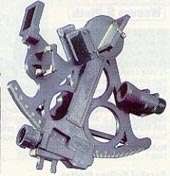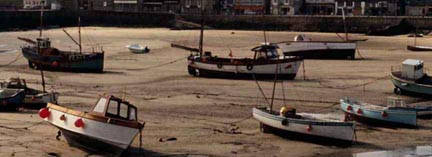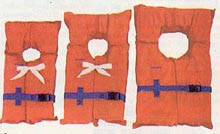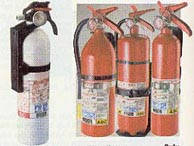Your First Boat
So youíre buying a new boat. What do you need to buy at the same time, such as electronics, safety equipment, etc., so that you can go fishing, diving, or boating right away?  First of all, you surely have decided what kind of boating you plan to do before you decided what kind of boat to buy, so I will give you an idea of some basics that you need for your new boat.
First of all, you surely have decided what kind of boating you plan to do before you decided what kind of boat to buy, so I will give you an idea of some basics that you need for your new boat.
The first and most important things should be the most obvious. Purchase the "Coast Guard Safety Package" that your dealer offers you when you buy the boat. Usually they include; life jackets (PFDs), whistles and chemical lights for your PFDs (so they can find you at night), flares, smoke and dye, fire extinguisher, and maybe a first aid kit with manual. You also need an anchor and chain with plenty of line (again, listen to the dealer). The size of the anchor and length of line depends on your use of the boat and the size of the boat. At the same time get docking lines (three or four twenty five foot lines will start you out), fenders (to keep mama and the kids from scarring the gel-coat or paint when they tie the boat up to the dock), a good spot light (donít say you never plan to go out at night, emergencies donít happen at your convenience), an air powered horn, a spare prop, prop nut, shear pin, cotter keys (whatever you need to replace a propeller on the water) and a tool box with basic tools. A good quality bilge pump and a back up bilge pump (They always quit working at the wrong time). By the way, donít ever put a power boat on the water without two batteries, and they should be installed by the dealer so that they have an "off , one, two and both" switch that is wired correctly for your boat. Thereís nothing worse than having two batteries and finding out that both of them are dead just when you need them.
 No matter what kind of boating you are planning, every boat owner needs to carry some other basic safety equipment. Number one is a radio. Actually more than one radio is recommended. Iím not talking about AM/FM here; all boaters need to carry a VHF marine radio. You probably will not find one of these at your local discount store, so you should consider letting the boat dealer sell and install your VHF when you buy the boat. You also need a hand held, battery operated VHF that you can either carry in your tackle box, pocket, emergency pack (more about this later) or just have available in its own holder on the dash board. Why do I need the second radio? (you ask, whining) If the worst happens and you have an emergency such as a sinking, you need a back-up radio for this occasion. Well, you say, my new boat is unsinkable. All right dummy, you had too many beers or sodas, listened to the AM/FM radio all day, maybe the kids brought a TV and had it plugged into the boat system watching junk all day, or maybe your $39.95 special battery just gave up the ghost. Now, how do you call for help? I have towed many of these careless boaters, and usually if it had not been for some good Samaritan that called for help on their radio when coming upon them, they would still be sitting out there wondering why their radio wasn't working. A decent VHF will cost you from $169.00 up. A decent hand-held is about the same price. Donít be stupid and scrimp, buy both! If you are going to fish fresh water areas too, you may want to buy a CB radio as well. Believe it or not, they are still used quite a bit and sometimes in out-of-the-way areas, CB may be the only radio-communications devices that are in use.
No matter what kind of boating you are planning, every boat owner needs to carry some other basic safety equipment. Number one is a radio. Actually more than one radio is recommended. Iím not talking about AM/FM here; all boaters need to carry a VHF marine radio. You probably will not find one of these at your local discount store, so you should consider letting the boat dealer sell and install your VHF when you buy the boat. You also need a hand held, battery operated VHF that you can either carry in your tackle box, pocket, emergency pack (more about this later) or just have available in its own holder on the dash board. Why do I need the second radio? (you ask, whining) If the worst happens and you have an emergency such as a sinking, you need a back-up radio for this occasion. Well, you say, my new boat is unsinkable. All right dummy, you had too many beers or sodas, listened to the AM/FM radio all day, maybe the kids brought a TV and had it plugged into the boat system watching junk all day, or maybe your $39.95 special battery just gave up the ghost. Now, how do you call for help? I have towed many of these careless boaters, and usually if it had not been for some good Samaritan that called for help on their radio when coming upon them, they would still be sitting out there wondering why their radio wasn't working. A decent VHF will cost you from $169.00 up. A decent hand-held is about the same price. Donít be stupid and scrimp, buy both! If you are going to fish fresh water areas too, you may want to buy a CB radio as well. Believe it or not, they are still used quite a bit and sometimes in out-of-the-way areas, CB may be the only radio-communications devices that are in use.
So now you are going fishing. How are you going to find the fish? Well, you will need a fish finder. These are available almost everywhere. They also run the gamut of prices, types (paper, LCD, video, and color video) and sizes. You will be able to find them from $89.00 up to several thousand dollars. Whatís the difference, you ask? Well, do you really think that if you are planning to do much fishing in the Gulf of Mexico or Atlantic Ocean that you will be able to find fish on a depth finder costing $100.00? You may, but if you really are interested in fishing, then you may as well plan to spend at least $500.00 for a decent color video fish finder. I wonít even talk about the other types for offshore fishing, they are a waste of money and time. I have used every type of fish finder, and for my money the color video is the only way to go offshore. For fresh water and shallow water bay fishing, an LCD is OK. Paper machines are only used by the die-hard hold-outs that think the old way is the only way and new technology is for the birds.
Now youíre going fishing. OK, how do you plan to navigate to the area that you want to fish, find it again, and more importantly, find your way back home?  Hopefully your dealer installed a compass on your dashboard, you will definitely need one. You will also need a GPS if you are going to be fishing offshore. Even for bay fishing and backcountry fishing, I recommend a GPS. It is extremely easy to get lost in the Ten Thousand Islands or even the backwaters of some of our larger bays around the state. There are plenty of good GPS units on the market from $250.00 and up. I have seen cheaper units, such as hand-helds, but remember, these are basically computers with a radio receiver built in and they are being up-graded every day with better and better units for less money by every manufacturer out there. I would definitely recommend that you do not buy a GPS that is over a year old. It will work OK but there will be at least six other new units that will do more for the same money. Spend as much as you can afford on this piece of equipment because one day it may save your life, also usually it will be a lot more user friendly if it has more "bells and whistles". The most important thing to know about GPS is that it only has an accuracy of +/- 125 meters. Thatís right, wayyy over the length of a football field, and remember, thatís a circular area, 125 meters in all directions. If you are going to be fishing offshore and looking for very small spots then you need a differential unit with your GPS. This is an add-on that also uses a radio signal from land to give your GPS an accuracy of +/- 10 feet supposedly.
Hopefully your dealer installed a compass on your dashboard, you will definitely need one. You will also need a GPS if you are going to be fishing offshore. Even for bay fishing and backcountry fishing, I recommend a GPS. It is extremely easy to get lost in the Ten Thousand Islands or even the backwaters of some of our larger bays around the state. There are plenty of good GPS units on the market from $250.00 and up. I have seen cheaper units, such as hand-helds, but remember, these are basically computers with a radio receiver built in and they are being up-graded every day with better and better units for less money by every manufacturer out there. I would definitely recommend that you do not buy a GPS that is over a year old. It will work OK but there will be at least six other new units that will do more for the same money. Spend as much as you can afford on this piece of equipment because one day it may save your life, also usually it will be a lot more user friendly if it has more "bells and whistles". The most important thing to know about GPS is that it only has an accuracy of +/- 125 meters. Thatís right, wayyy over the length of a football field, and remember, thatís a circular area, 125 meters in all directions. If you are going to be fishing offshore and looking for very small spots then you need a differential unit with your GPS. This is an add-on that also uses a radio signal from land to give your GPS an accuracy of +/- 10 feet supposedly.
Now you can go fishing, right? If you are new to boating, NO! Accident reports are filled out every weekend on people who thought boats were just like cars. If you have not run boats before, please donít get on the water, at least not within 100 miles of my home area. The best thing that you could do for yourself and everyone else that will be on your boat, or even on the same waters with you, is make an appointment with either the US Coast Guard Auxiliary or the US Power Squadron and take the entire family with you for their boating course. It is my opinion that no one should be allowed behind the wheel of a boat unless they have taken one of these courses. Do not let your wife or children try to talk their way out of the course. It may cost you your life. Think about this, if you have a heart attack while you and your family are out on the water and they donít even know how to properly use the radio or navigate their way home, do you live or die while they panic? Also, you will gain a tremendous amount of local knowledge about the waters that you will be boating on by taking one of these courses. If you think that all you need to do is crank the boat, put it in gear, and go, then I or someone else will probably be pulling you off a sand bar in the very near future.
This brings up another thing that you should have on the boat with you at all times, and that is a membership in a towing association, Boat US, Vessel Assist Association of America, or Sea-Tow. If you run your new boat aground in a major metropolitan area with a lot of towing services, the average cost to pull you off is $200.00-$300.00. If you run out of gas, it is about the same. If you need to be towed somewhere; the average tow job in my area of Tampa Bay is $500.00. If you are in an area that is not so heavily populated, the sky is the limit! I have seen invoices for $1600.00 for a simple tow. Do you have that much money? Donít think that just because your boat insurance has towing coverage that you are OK. You will have to pay the tower in advance and then file with your insurance company for reimbursement. Join one of these organizations before you take the first trip in your boat, the membership will pay for itself the first time you need it. There are also many fringe benefits to membership such as radio checks, float plans, and many other things that will help you to stay safe and feel secure on the water.
towing association, Boat US, Vessel Assist Association of America, or Sea-Tow. If you run your new boat aground in a major metropolitan area with a lot of towing services, the average cost to pull you off is $200.00-$300.00. If you run out of gas, it is about the same. If you need to be towed somewhere; the average tow job in my area of Tampa Bay is $500.00. If you are in an area that is not so heavily populated, the sky is the limit! I have seen invoices for $1600.00 for a simple tow. Do you have that much money? Donít think that just because your boat insurance has towing coverage that you are OK. You will have to pay the tower in advance and then file with your insurance company for reimbursement. Join one of these organizations before you take the first trip in your boat, the membership will pay for itself the first time you need it. There are also many fringe benefits to membership such as radio checks, float plans, and many other things that will help you to stay safe and feel secure on the water.
I recommended quite a few things that you should let your dealer sell you and install. The reason for this is that too many people feel that they can get better deals from a catalogue or discount store, but then they realize too late, that they have to purchase these items out of their pocket and they start scrimping. Or, worse yet, they put off the purchase until a later date, maybe when the next paycheck comes in, and they go boating without badly needed equipment. Sometimes the installation that you do at home in the driveway can cause more problems to your boat than you could imagine. If you need electrical wire to install you radio, fish finder, or spare battery, would you go to the hardware store for it? NO!!!!! They generally donít carry marine grade, USCG approved wire and there is a BIG difference. Also, what size wire would you use and what type of wire connectors. If you donít solder all your connections, they wonít last a year in the salt-water environment. Donít get caught short on the water. The life you save may be your own.
List of "must have" safety gear to keep on the boat at all times:
Life jacket (PFD) for every person on the boat
Chemical light and whistle for each PFD
Flares, smoke, and dye
Air powered horn
Fire extinguisher
First aid kit with manual (preferably waterproof)
Anchor and line
Dock lines
Drinking water
List of safety items you should carry in a "boat bag":
Flashlight
Area charts
Hand held VHF radio (check the battery regularly)
Binoculars (recommend 7x50)
Sun screen
Knife
Here's a list of safety equipment from BoatUS:
http://www.boatus.com/onlinecourse/documents/REGULATIonS.html
Have fun on the water and be sure to be safe.
Capt.Charlie


